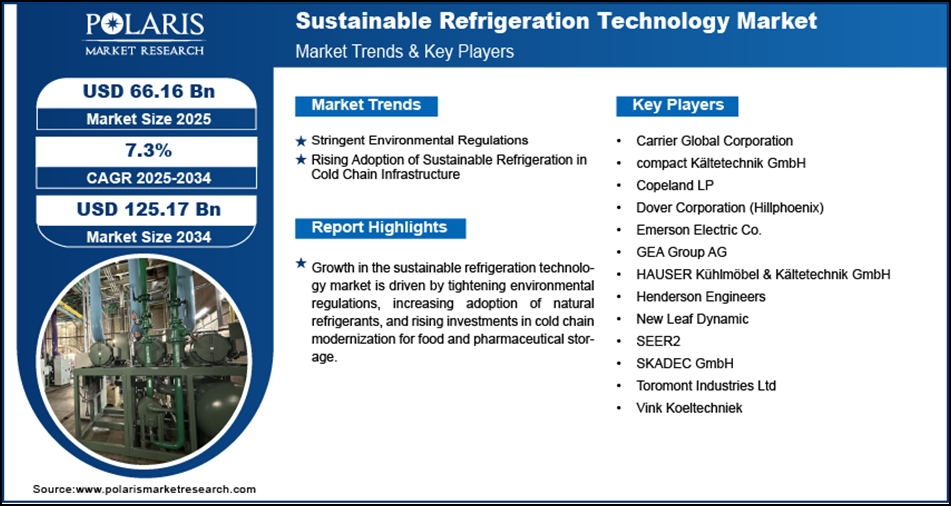Refrigeration is highly important for keeping foods fresh, medicines safe, and climates comfortable, but conventional methods harm the environment. The need is even more urgent at this time of rising climate change, which requires better alternatives. Therefore, it calls for sustainable refrigeration: tech-enabled solutions to reduce this impact.
Do you know that the global sustainable refrigeration technology market was valued at USD 61.90 billion in 2024? Polaris Market Research has estimated that it is expected to grow at a CAGR of 7.3% from 2025 to 2034.
What is Sustainable Refrigeration?
Sustainable refrigeration includes cooling technologies that, in operation, use less energy and have a reduced environmental impact. Such systems reduce greenhouse gas emissions, employ natural refrigerants, and improve energy efficiency. They help fight global warming, reducing the carbon footprint of refrigeration.
Why is Sustainable Refrigeration Important?
Refrigeration systems have conventionally relied on synthetic refrigerants containing hydrofluorocarbons, potent greenhouse gases. The refrigerants add to global warming. Many refrigeration systems are also major consumers of electricity, largely sourced from fossil fuels. Certainly, more sustainable alternatives are needed, and these technologies can help do just that:
- Reduce greenhouse gas emissions
- Lower energy consumption
- Decrease the carbon footprint of refrigeration
- Assist in meeting environmental regulations
Types of Sustainable Refrigeration Technologies
Several technologies contribute to sustainability in refrigeration. These include, among others:

Transcritical CO2 Systems
Transcritical CO2 systems use carbon dioxide as a refrigerant that works efficiently under very high pressures and temperatures. Energy-efficient and with very low GWP, these systems are used in supermarkets to preserve food items and in general industrial cooling; hence, they are very environmentally friendly.
Also Read: SBI Capital Markets (SBICAPS) Report on Sustainable Energy
Ammonia-based Refrigeration
Ammonia (NH3) is an effective refrigerant and is neutral to ozone. It is very performing, with a low environmental impact, thus it is suitable for large cooling applications in the food-processing industry and cold storage.
Hydrocarbon Refrigerants (R-290 and R-600a)
Natural refrigerants such as propane (R-290) and isobutane (R-600a) are hydrocarbons with low GWPs. They are used in both domestic and commercial refrigeration; they are cost-effective, efficient, and environmentally friendly. As such, they represent a highly popular sustainable alternative to synthetic refrigerants.
Magnetic Refrigeration
Magnetic refrigeration cools materials using a magnetic field, with no chemical refrigerants and minimal energy use. This new technology is a very promising and green alternative for refrigeration in the near future.
Solar-Powered Refrigeration
Solar-powered refrigeration utilizes solar panels to generate electricity for cooling units. Ideal for off-grid areas, it reduces reliance on fossil fuels and energy costs by offering an eco-friendly solution, especially in sunny regions.
Why is Sustainable Refrigeration Market Expanding?
- The strict environmental regulations to phase out high-GWP refrigerants are boosting demand for sustainable technologies across the commercial, industrial, and residential sectors.
- The expansion of cold chain infrastructure for food preservation, vaccines, and pharmaceutical logistics demands more efficient, low-emission refrigeration systems.
- The rise of IoT and smart monitoring systems offers significant opportunities to improve refrigeration efficiency and reduce maintenance costs.
- The growing consumer demand for more eco-friendly products is forcing businesses to adopt greener refrigeration options.
What Does Future Hold for Sustainable Refrigeration?
Stricter regulations and new technologies characterize the future of sustainable refrigeration. Natural refrigerants like CO2 and ammonia will see wider application, while new developments in efficiency, IoT integrations, and solar-powered systems will contribute to cost reduction. As demand for energy efficiency increases, sustainable refrigeration technologies will be at the heart of industries focused on food preservation and cold chain logistics.
Final Thoughts
Sustainable refrigeration will play a key role in reducing environmental impacts and dealing with climate change. Energy-efficient systems combined with natural refrigerants will contribute to lower emissions and less energy use. With continued demand for environmentally friendly solutions, sustainable refrigeration is set to take center stage in shaping a greener future. At the same time, innovations will drive the market over the next few years.
Source : Press Release